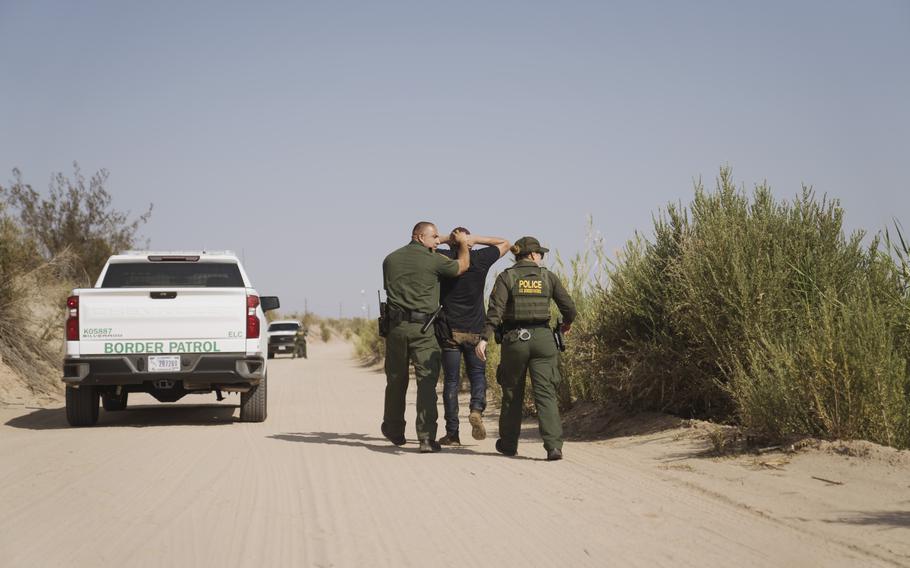
U.S. Border Patrol agents capture a migrant near the U.S. and Mexico border fence in Calexico, California, U.S., on Tuesday, Sept. 14, 2021. (Eric Thayer/Bloomberg)
Migrant communities in cities from New York to Chicago and Los Angeles remain on edge after President Donald Trump vowed to start mass deportations and issued orders including handing immigration agents power to enter churches and schools, sites that previously were protected.
“Criminals will no longer be able to hide in America’s schools and churches to avoid arrest,” a Department of Homeland Security spokesperson said in a statement on Tuesday. “The Trump Administration will not tie the hands of our brave law enforcement, and instead trusts them to use common sense.”
Trump promised that he would crack down on immigration on Day One of his new presidency, with the focus on those who have committed violent crimes. Despite his hardline rhetoric and the flurry of executive orders there were few signs of additional enforcement, even as his border czar Tom Homan told Fox News that raids were already happening across the U.S. and that ICE arrested 308 serious criminals on Tuesday.
In places such as Chicago’s Little Village, shelters in New York and restaurants in Washington, DC, there was largely anxiety among migrants over what may be coming.
“I’m afraid, but I have to go outside. I have to work,” Diana Medrica, who fled Venezuela with her husband and son a year ago, said outside a shelter in Brooklyn. “If immigration shows up I don’t know what I’ll do.”
Trump has pledged to enact the largest mass deportation operation in U.S. history, targeting an estimated 11 million people who are in the country illegally. He’s declared a national emergency at the southern border and announced plans to restrict birthright citizenship for children of undocumented immigrants, a move that sparked legal challenges from Democratic-led states.
Trump’s order on Tuesday is a switch from a long-standing policy that restricted U.S. Immigration and Customs Enforcement, as well as Customs and Border Protection, from conducting operations at schools, places of worship, hospitals, and events such as weddings and funerals. The rollback eliminates protections meant to ensure immigrants could access essential services without fear of arrest.
Olivia Golden, interim executive director of the Center for Law and Social Policy, said ending the sensitive-areas policy could destabilize entire communities. It increases the chances of children witnessing the arrest or their parents and raises the stress levels for teachers and caregivers.
“This action could have devastating consequences for immigrant families and their children, including U.S. citizen children, deterring them from receiving medical attention, seeking out disaster relief, attending school, and carrying out everyday activities,” Golden said.
The administration also moved to disband the Biden-era Family Reunification Task Force, which worked to reunite children who were split up from their parents under Trump’s first-term family separation policy.
Roughly 4,600 migrant children were separated from their parents during the Trump administration. As of March, about 70% had been reunited with their families, according to a DHS status report.
Amy Fischer, director of the Refugee and Migrant Rights Program at Amnesty International USA, condemned the measures, calling them a return to a “harmful, racist, anti-immigrant agenda.”
“Family separation and detention is an inherently cruel practice that results in significant and long-lasting trauma for children,” Fischer said.
In a separate move, the administration reinstated the controversial “Remain in Mexico” policy, officially known as the Migrant Protection Protocols. The program forces asylum seekers to wait in Mexico while their cases are adjudicated in the U.S. immigration courts. Most migrants subjected to the policy were ultimately denied asylum. Mexican President Claudia Sheinbaum appeared to accept that the U.S. would be turning back certain migrants to Mexico, implying that it was a unilateral decision.
“This has nothing to do with the ‘safe third country’ and all that, but is a statement from the United States government. What do we do about it?,” Sheinbaum said in a statement posted to the Mexican government’s website on Tuesday. Mexico will “act in a humanitarian manner” and potentially help non-Mexicans return to their home countries, she said.
During Trump’s inauguration celebrations on Monday, the administration abruptly ended the CBP One app system, which had allowed migrants to schedule appointments along the southern border. The decision effectively closed legal avenues for most asylum seekers.